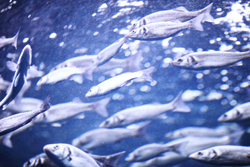Genetic testing for brood-spawning fish
Selective breeding for mass-spawning and communally reared fish such as the European seabass and the gilthead seabream, is difficult because it is hard to control the contribution of specific parents in a brood. The industry also requires a way to limit inbreeding, and to regulate when and how the breeding animals spawn. The EU-funded REPROSEL(opens in new window) project aimed to improve selective breeding methodology in these two commercial species by designing and testing a high-throughput genetic heritage test. In addition, the consortium wanted to design selective breeding schemes and to produce guidelines for farmers regarding mass spawning and communally reared marine fish species. Researchers analysed several commercial breeding facilities to identify ways to improve spawning efficiency. They found that hormone treatments were successful in synchronising spawning in both species. To design the genetic tests, data was collected from various public databases to develop single nucleotide polymorphism) (SNP) and short tandem repeats (STR) markers, which could be used to differentiate individual fish. Software was then developed to allocate parentage based on genetic similarity. Testing showed that the software was able to identify both parents with up to 99–100% accuracy. Using this newly developed tool along with a breeding simulation programme, REPROSEL produced optimised breeding schemes that resulted in less than 1% inbreeding and improved breeding efficiency. The project also published a set of guidelines for farmers on selective breeding schemes for mass spawning and communally reared marine fish species. For mass-spawning fish breeders, REPROSEL outcomes offer great benefits in terms of genetic improvement of their fish and thus potential economic efficiency. More sustainable breeding programmes and an improvement in the competitiveness of the breeders' market are expected.







